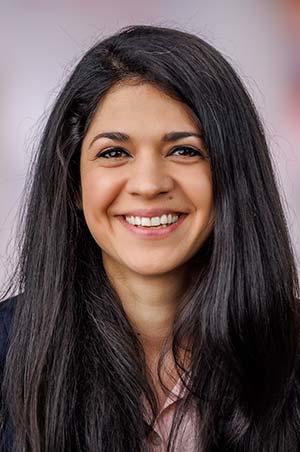What do you love about your job as a scientist?
I love all the connections. We are a disease-focused lab, and this inevitably takes us into different realms of biology. We tend to focus on the epigenome, but, from there, it quickly goes beyond. In the end, you are looking at phenotypes, how the cell behaves, their dependencies, and what we can target.
I find it remarkably fascinating how you can think you are looking at disparate things, and then all of it comes together as an amazingly well-orchestrated system. Those connections and being able to make discoveries are what excite me the most.
Why do you think fundamental cancer research is important?
Studying cancer biology, to me, is never forgetting the patient. There are patients out there that we need to help. I have been the family member sitting in the hospital room, hoping for the next discovery that could potentially cure my loved one. Any amount of progress we make has the potential to save people, and that is a very meaningful pursuit.
Based on your research experiences, what advice do you give to trainees and the next generation of scientists?
I think developing scientific intuition and flexibility, in other words an ability to pivot, is important. We all state hypotheses and, a lot of the time, they are wrong. To be successful, you have to continue to reinvent the question and reinvent the ways in which you are looking at it.
It is constantly adapting to the data that you get, really looking at and digesting it. If your hypothesis is incorrect, you must ask, “What is the next hypothesis? What other observations do you see in your data?”
I think that those who can be resilient and flexible are the ones who are able to be successful in science.
Can you describe your lab’s cancer biology research?
We are interested in looking at different genetic and transcriptional subtypes of both pancreatic cancer and cholangiocarcinoma to determine what drives their growth and progression.
Each tumor subtype behaves differently and is dependent on different things. If we can understand their differences, we can potentially pair subtype specific therapies with a patient profile to make more specific and personalized treatments.
Right now, generally most patients are treated with the same therapy. You get responders, you get people where the treatment has no effect, and then you have individuals who actually experience an adverse event.
Could there be a way to parse out the disease more to improve that? This is what we are trying to do.
How is your lab translating your cancer biology research to the clinic?
We are currently translating our experimental findings showing that a subtype of pancreatic cancer is more susceptible to an inhibitor of cyclin-dependent kinase 7 (CDK7) in a Phase I clinical trial.
Based on previous work in the field, we think that FOLFIRINOX (a standard of care chemotherapy treatment for patients with pancreatic cancer) pushes tumor cells into a basal state, which is aggressive and undifferentiated. So, we are testing the efficacy of a CDK7 inhibitor that targets basal pancreatic cancer in patients treated with FOLFIRINOX. We are also taking biopsies over time to identify biomarkers of response and resistance to the CDK7 inhibitor.
We ultimately hope that this work can improve treatment and outcomes for patients with an aggressive subtype of pancreatic cancer.
